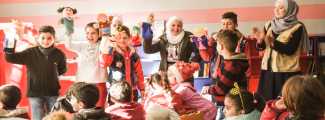UNHCR
Mon, 03/02/2020 - 07:54
Interactive Theater Show - Banyass
Sun, 03/01/2020 - 14:54
Interactive Theater: Needle and Thread - Sweida
Sun, 03/01/2020 - 14:47
GBV: Empowering the Women’s Committee - Banyass
Sun, 03/01/2020 - 14:25
“Carpentry” Activity – Hameh, Rural Damascus
Sun, 03/01/2020 - 14:23





